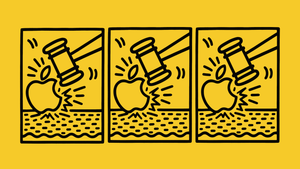Apple is facing another class action lawsuit, this time in France, over its App Store policies that force music streaming services to use its own commission-charging transactions platform when signing up users via their iOS apps.
French consumer rights group CLCV has filed a class action lawsuit with the Paris Judicial Court, arguing that Apple’s App Store policies caused both “economic and moral harms” for consumers who wanted to sign up to music services other than Apple Music via their iPhones.
Because Apple’s commission on in-app payments can be up to 30%, and streaming services are already paying up to 70% of their revenues over to the music industry, the likes of Spotify and Deezer simply passed the Apple commissions onto the consumer.
Another Apple rule meant that they couldn’t tell new subscribers within their iOS apps that they could avoid those extra costs by instead signing up via the Spotify or Deezer websites.
That’s why CLCV reckons there was both economic and moral harm. Economic harm “due to the additional cost paid each month”, and moral harm “linked to the deprivation of fair information and the restriction of freedom of choice”.
Spotify has been scathing about Apple’s in-app payment rules for years, as have app developers across the board, not just in music. Some app developers sued Apple, claiming the rules constituted anticompetitive conduct, while others - including Spotify - urged regulators to intervene and force a change to the rules on competition law grounds.
Spotify’s formal complaint within the European Union resulted in the European Commission ruling that Apple had abused its dominant position. It fined the tech giant €1.8 billion and ordered the anticompetitive App Store rules be changed.
CLCV references the EC ruling in a statement announcing its lawsuit, before adding that it believes Apple’s practices also constituted “misleading commercial practices” under French law, harming consumers as well as app developers, hence the lawsuit. The consumer rights group says it aims to “obtain compensation for all affected consumers”.
This isn’t the first lawsuit that targets Apple's App Stores rules from the perspective of consumers rather than app developers. Last year pan-European consumer rights group Euroconsumers announced it was filing similar lawsuits in Belgium, Italy, Spain and Portugal.
Meanwhile, a class action was filed on behalf of UK consumers in 2021, with the Competition Appeal Tribunal ruling that the App Store rules were “excessive and unfair” just last month. That ruling means Apple may now have to pay out £1.5 billion to UK consumers who paid higher subscription fees as a result of the App Store rules.
Spotify actually stopped allowing people to sign up via its iOS app in 2016, although consumers who had already subscribed through the app by that point could still have been paying the extra Apple fees each month until 2023. That’s when Spotify cancelled all the subscriptions that still included Apple fees, forcing those users to re-sign up directly via the streaming service’s website.
Although Spotify stopping iOS sign-ups in 2016 meant no new subscribers after that point would be paying extra Apple fees, that decision had a negative impact on the streaming service itself.
Its business model has relied heavily over the years on hooking people in with the free version of its service and then upselling premium. The upsell is harder when users can’t upgrade within the app - and Spotify can’t even overtly direct users to its website.
The Apple fees have also proven problematic as Spotify has moved into audiobooks and looked to offer podcast monetisation tools, and are also possibly why Spotify’s efforts to offer artists direct-to-fan tools have been decidedly lacklustre over the years.
That said, as a result of litigation and regulator rulings, in some markets Apple’s rules have relaxed somewhat, meaning Spotify is now able to sign-post other payment options in some countries.

